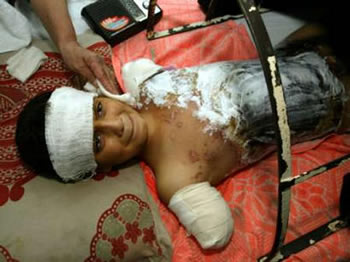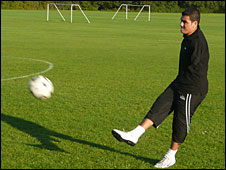
A frightened boy, stumps bandaged and fighting back tears, gazes into a camera from in his hospital bed.
The picture, beamed to newspaper editors around the world, touched hearts everywhere. Overnight 12-year-old Ali Ismail Abbas became the human face of the Iraq war
Ali lived on the outskirts of Baghdad with his parents, brother and fourteen other members of his extended family. On March 2003, while everyone was asleep, the Americans launched a rocket attack on the area. One of the missiles landed on the family home, killing everyone except Ali. His injuries were horrific - third-degree burns over 35 percent of his body and such severe damage to his arms and hands they had to be amputated.Ali's injuries required treatment war-torn Iraq couldn't provide. So once doctors gave permission for him to be moved he was flown to Kuwait. Meanwhile the Limbless Association was raising money to bring Ali to London and fit him with prosthetic arms. The prosthetics weren't a great success, however. Ali found them too cumbersome and eventually decided he could manage far better wiithout.
But what about the emotional and psychological damage? Was it possible, people asked, for a child who'd
lost his arms and entire family in the most horrifying of circumstances
to ever recover?
 Buddhism teaches the extraordinary potential of the human spirit for transforming negative into positive. Today Ali, who lives with an
uncle in London, is a well-adjusted eighteen-year-old with a passion for football. His record for
‘kick-ups’ (keeping the ball in the air) is 98. He's so good, in fact, he plays for both
Chelsea and Tottenham on their disabled teams. Read more.
Buddhism teaches the extraordinary potential of the human spirit for transforming negative into positive. Today Ali, who lives with an
uncle in London, is a well-adjusted eighteen-year-old with a passion for football. His record for
‘kick-ups’ (keeping the ball in the air) is 98. He's so good, in fact, he plays for both
Chelsea and Tottenham on their disabled teams. Read more.
